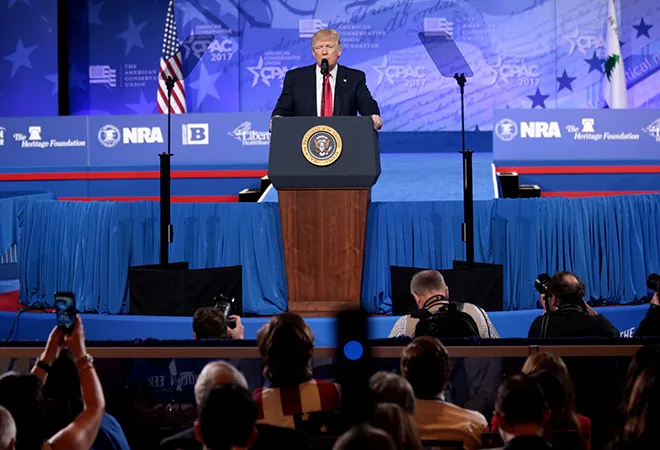
US President Donald Trump's decision to launch a cruise missile attack on Syria has won some unexpected praise but also generated a significant amount of criticism. Though Trump administration officials have said they had no plans for any unilateral action to overthrow the Assad regime, they have also not ruled out further military action, presumably if the Assad regime in Syria crosses the line again by using chemical weapons.
Though the missile attack was a limited action, it does have some big implications. The most important is that other major powers, particularly Russia and China, can no longer assume that Trump's "America First" slogan will leave them in control of the field of the game. For Washington's partners, particularly in Asia and the Middle East, this will even the field because even if these strikes do not generate any greater confidence of US support to its partners, it will reduce the confidence of ambitious regional hegemons that Washington is no longer in play.
Though the cruise missile attack on Syria was a limited action, it does have some big implications.
The attack has brought Trump some unexpected Republican support from critics within the Republican fold such as Senators John McCain and Marco Rubio, and indeed from across the US Senate. Even former Obama officials have stepped up to praise Trump's Syrian strike, including, reportedly, John Kerry who was Obama's Secretary of State.
There are of course significant questions about the strike, especially about what it accomplished. One criticism is that the strike itself did little real damage to either Syria's war capacity or to the al-Shayrat airbase, which started conducting further bombing raids fairly quickly. But this ignores the fact that the point of the strike was to send a deterrence message rather than to actually eliminate significant Syrian military capacity or even its chemical warfare stocks. Some have questioned whether such strikes have any deterrence value unless the US intends to continue its attacks or put ground forces into Syria, while others have pointed to the possibility of further escalation that potentially drags the US into a confrontation with Russia. All these are reasonably valid concerns, but they ignore the central point of the strike: if the Assad regime contemplates further chemical weapons use, they will have to consider seriously the possibility of an American retaliation.
There is an even larger message in these attacks. They also send a message to Washington's partners as well as potential adversaries that they will not ignore. America's partners were moving from worrying about fecklessness of American commitment, to near certainty of the loss of American commitment. Especially in Asia, and to a degree in the Middle East, the increasing concern about US’s reluctance to balance against rising hegemons under Obama was heightened by President Trump's seeming antipathy to allies, whom he thought were free-riders, as well as the unilateralism in his worldview in which the US would strengthen itself and take action on the basis of its own judgment than in the common interest.
Read also | What Obama has wrought
The consequence was that smaller regional "secondary" powers in Asia were increasingly in look for alternatives. For some, such as Philippine President Rodrigo Duterte, this meant possibly seeking an accommodation with China, though this faces significant opposition even from his own defence officials. For most others, this has meant increasing their own defence preparedness, as well as seeking common positions and military cooperation with others in the region who are equally concerned about the increasing imbalance in the region. Regional partnerships of various kinds between Japan, Australia, India, Vietnam, Singapore and others have accelerated in the last few years. But the imbalance of power between China and the others, which is still growing, is so great already that neither national efforts or even collective ones are likely to right the balance. If these countries are nevertheless walking down this path, it is because they have little choice. Obama, followed by Trump, appeared to suggest to them that they could very well be on their own.
One missile strike will not change this. But after eight years of feckless foreign policy under Obama, in which the US was willing to turn away from its allies, where adversaries of both the US and of the liberal international order were increasingly confident that they could act with impunity, this was a necessary reminder of American power, of the simple truth that it is not American capacity that is lacking but Washington's willingness to employ it.
But there is also another message. The strike also demonstrates again Trump's fickleness and it was clearly prompted by no great change in Trump's foreign policy principles, assuming that he even has any. The basic "America First" theme also now appears out the window because Trump has abandoned even this with nary a thought to the promises his followers thought he had made, to their considerable anger.
The strike demonstrates again Trump's fickleness and it was clearly prompted by no great change in Trump's foreign policy principles.
It, however, also demonstrates that Trump's fickleness goes both ways: it is not just that American allies are no longer sure that they can count on Washington, but also that now their potential adversaries can no longer be confident that Trump will not step in either. As one observer put it, Trump's "improvisational and situational approach" injects both a risky unpredictability into relations with possible adversaries and also "eases allies' fear." For America's regional partners in Asia, the growing fear that the US will no longer be available to balance China has been marginally adjusted by the hope that China can no longer be confident that the US will no longer balance it. This is not much, and it is a slender reed to hold on to, if you are an American partner. But it is possibly better than being certain that the US is no longer a player.
The views expressed above belong to the author(s). ORF research and analyses now available on Telegram! Click here to access our curated content — blogs, longforms and interviews.




 PREV
PREV


